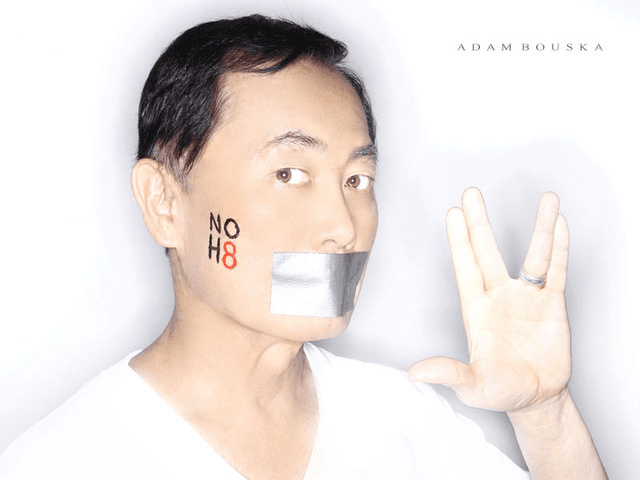These words did not come out of the mouth of a white segregationist, or a closet bigot living in San Francisco.
These words were uttered by former Commander Sulu of Star Trek, known to all of us as George Takei.
 |
| George Takei (NoH8campaign.com) |
What prompted these outrageous, offensive remarks?
Takei explained to Fox News in Phoenix, Arizona how offended he was by Justice Thomas' dissenting opinion in Obergefell v. Hodges, which imposed same-sex marriage on all fifty states:
And for him [Thomas] to say, "slaves have dignity". I mean, doesn’t he know that slaves were in chains? That they were whipped on the back. If he saw the movie 12 Years a Slave, you know, they were raped. And he says they had dignity as slaves or – My parents lost everything that they worked for, in the middle of their lives, in their 30s [during the Japanese internment during World War II]. His business, my father’s business, our home, our freedom and we’re supposed to call that dignified? Marched out of our homes at gun point. I mean, this man does not belong on the Supreme Court. He is an embarrassment. He is a disgrace to America.
What exactly did Justice Thomas write down in his dissent? Was he justifying slavery, or the internment of 112,000 Japanese-Americans whose only crime was their ethnic identity?
Here are the first remarks:
The Court’s decision today is at odds not only with the Constitution, but with the principles upon which our Nation was built.
A number of conservative and legal minds, whether left or right, have shared these concerns.
Since well before 1787, liberty has been understood as freedom from government action, not entitlement to government benefits.
Liberty is about freedom from coercion of the state. Without a doubt, Thomas understands freedom, liberty, and the rule of law, plus his role on the highest court in the land.
Regarding the matter of dignity, and the Constitution's role:
Yet the majority invokes our Constitution in the name of a "liberty" that the Framers would not have recognized, to the detriment of the liberty they sought to protect. Along the way, it rejects the idea—captured in our Declaration of Independence—that human dignity is innate and suggests instead that it comes from the Government. This distortion of our Constitution not only ignores the text, it inverts the relationship between the individual and the state in our Republic.
Dignity is something that every person has, regardless of the opinions of the state or the activities of men and women in government. Dignity is not something which the government can give or take away. Not at all. Never did Thomas claim that the slaves of the Ante-Bellum South were dignified because of their status of involuntary servitude.
Thomas' dissent follows a historical as well as linguistic analysis of the term "liberty" in the Fourteenth Amendment, including erudite references to Magna Carta and Blackstone's legal analyses:
Even assuming that the "liberty" in those Clauses encompasses something more than freedom from physical restraint, it would not include the types of rights claimed by the majority. In the American legal tradition, liberty has long been understood as individual freedom from governmental action, not as a right to a particular governmental entitlement.
The Associate Justice is no clown, and no fool.
Regarding the "dignity" argument from the petitioners seeking recognition of same-sex marriage, Thomas gave a thorough explanation:
Human dignity has long been understood in this country to be innate. When the Framers proclaimed in the Declaration of Independence that "all men are created equal" and "endowed by their Creator with certain unalienable Rights," they referred to a vision of mankind in which all humans are created in the image of God and therefore of inherent worth. That vision is the foundation upon which this Nation was built.
In no way was Thomas justifying slavery, internment, or involuntary servitude of any kind. Throughout his dissent, Thomas clearly defined "liberty" as freedom from government intrusion, intervention, and imposition.
Then comes the final summation of the Justice's just judgments:
Our Constitution—like the Declaration of Independence before it—was predicated on a simple truth: One’s liberty, not to mention one’s dignity, was something to be shielded from—not provided by—the State.
Takei was not interested in the dissenting opinion. He was only interested in disrespect and dishonor for anyone who would not agree with his views about marriage.
The former Star Trek icon has descended into a racist, bigoted rhetorician, who has no reserve about cursing and swearing, and demeaning anyone who opposes homosexuality and homosexual marriage.
Strange indeed coming from a man who identifies himself on Twitter as "a believer in, and a fighter for, the equality and dignity of all human beings."
No comments:
Post a Comment